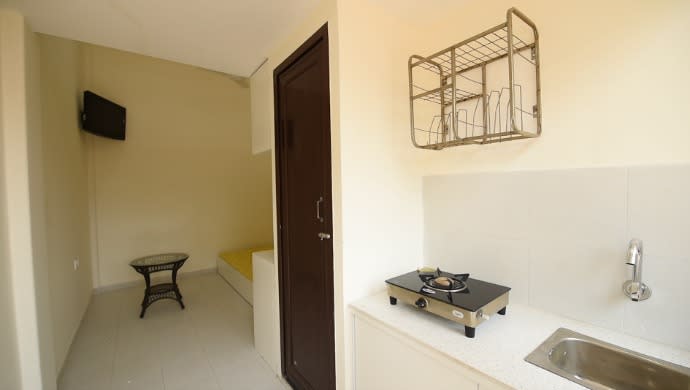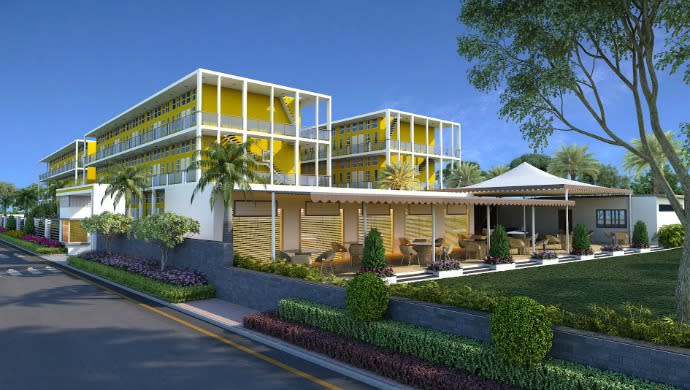US$2 a night for hotel room in Dubai or Mumbai? Can’t believe? This startup is making the impossible possible
Chototel aims to impact millions of people living in the bottom-of-the-pyramid of the society across the world
A Chototel room
What can a US$2 bill get you? If you are in India, you might not get even a kilogram of toor dal (pigeon peas), one of the most consumed items. And a full-course meal in a decent restaurant in Bangalore or Mumbai will cost you more than that. If you are in Dubai or New York, you will not get even a bottle of water for US$2.
No, don’t underestimate the power of US$2 yet. Even if you don’t get a full course meal, you would at least get a day’s stay for this small amount, in a clean hotel room with a bed and free Wi-Fi, not just in India, but in some of world’s largest metro cities.
Hard to digest?

The Chototel team, with Founder Rhea Silva (centre)
A 24-year-old Mumbai girl has set up a hotel chain — Chototel — where you can get a day’s stay for US$2 in a clean room seen in the above picture.
“Access to decent affordable shelter is so fundamental to the health and wellbeing of people and the smooth functioning of economies. Yet, in developing and advanced economies alike, cities struggle with the challenge of accommodating their poorest citizens,” says Rhea Silva, Founder of Chototel.
“While working in the affordable housing industry after studies, I realised that there is a huge need for housing for people living in the BoP. We at Chototel aim to provide an alternative to housing needs of people without binding them to lease agreements etc.,” adds Silva, a graduate in Law and Management Studies.
This way, Chototel aims to impact millions of people living in the bottom-of-the-pyramid of the society across the world.
A pioneer of super-budget hotels
Chototel — a play of Choto (small in Hindi and Japanese) and hotel — was set up in 2015. The startup is rolling out ‘super-budget-hotels’ where tariff start from US$2 per day, with uninterrupted utilities and social infrastructure such as crèches, community kitchens etc.
The company has started its dream run with a pilot in Nagathane, a city on the Mumbai-Bangalore highway. It picked India to launch the pilot because Silva believes the demography will not fail them.
“Rapid urbanisation is happening in India and our assets would be much more worth after five or 10 years.”
You might still be wondering how Chototel manages to provide hotel stay at US$2 a day. Silva has the answer to this question.

“Our business model works on the fact that we have income from daily rents. We also charge customers for utility consumption and consumption of other services such as creche for children and community kitchen, where the tenant can go and eat his/her meal. More importantly, all our utilities are off-grid, so we don’t have to depend on governments for electricity, water and gas connections. This way we have managed to reduce operating costs,” Silva tells e27.
Silva and the team have developed a technology to monitor the utility consuming on a real-time basis. Chototel rooms are outfitted with microbots, which take in several data points to report back to the hotel and the tenant.
The user can also monitor the consumption using a mobile app.
“Essentially, if a user checks in, we can see how much electricity he consumes. The money we get from utility services go into running of the hotel, whereas the money we get from rental goes back to repaying the capital we used to build the asset,” she explains.
The entire hotel is built in a way that there is zero maintenance; the beds are made of rexine and so it is not easily destroyable. And the furniture is made of steel and is durable.
The rooms are managed by self-help groups or SHGs, a community of non-working spouses who maintain the rooms and operate the community kitchen and creche.
As of now, the founder has invested her own money to build the hotel chain. In future, the company plans to raise investment to build more buildings across the world. “We are looking to raise investment from impact investors and social funds in the UK,” she says confidently.
The company is now eyeing some of the largest cities in the world to expand the business. They include Dubai, Bristol and Lagos, in addition to Mumbai, Gujarat, Goa and Pune in India.
“Our strategy in every location is to partner with developers who have expertise in their respective geographies. So when we go to Dubai or Bristol, we will partner with developers who already have insights of the geography. They will build assets according to our specifications and requirements. In real estate, there is a need for creating supply. So every developer will create these assets for us as long as we create supply for them,” she points out.
“Not only will we be able to provide our investors with a monthly yield from the rents, they will also benefit from the appreciating value of our assets themselves,” she says.

Chototel was incorporated in London because this is where all the impact investment activities are happening in the world, says Silva. “Plus, UK’s legal system is very supportive that impact investors will find it comfortable to put money in a business based in the country.”
Chototel is a member of the social stock exchange — a network for all socially and environmentally-minded companies.
The startup also runs an office in Mumbai. While Silva and the marketing team are sitting in the London office, the technology and business development activities are managed from the Mumbai office.
Chototel is a startup that will definitely impact millions of people across the world. As for India, with a huge portion residing in slums, Chototel is a God-send. And once Silva’s project kicks off, the slum dwellers at least get a night’s stay in a decent room for a meagre sum in Mumbai, where India’s expensive house Antilla — owned by billionaire industrialist Mukesh Ambani — is situated.
The post US$2 a night for hotel room in Dubai or Mumbai? Can’t believe? This startup is making the impossible possible appeared first on e27.



